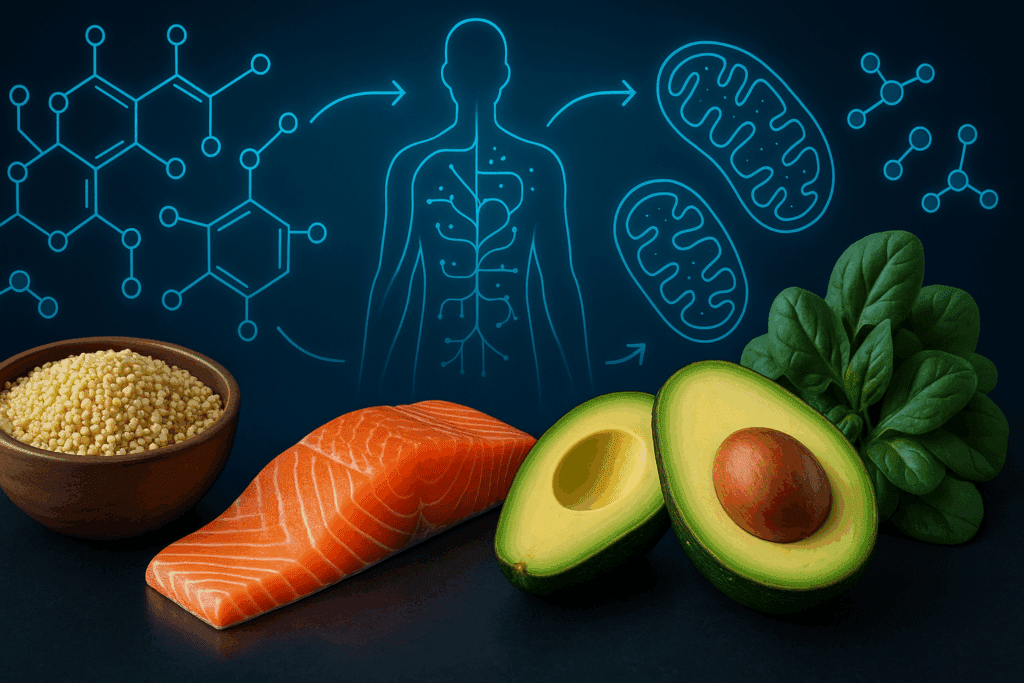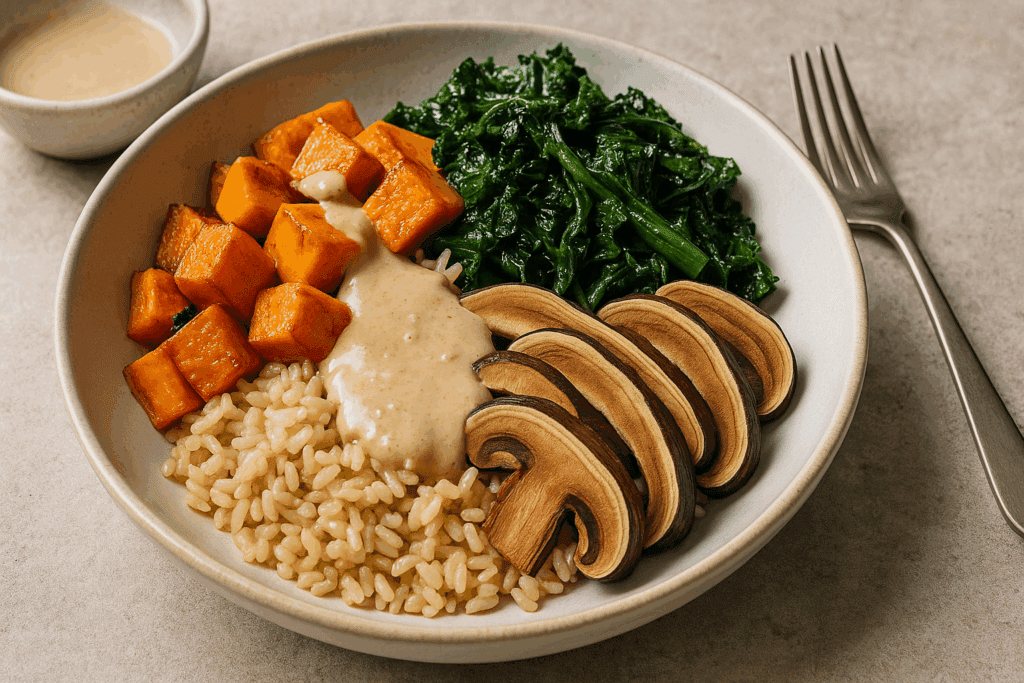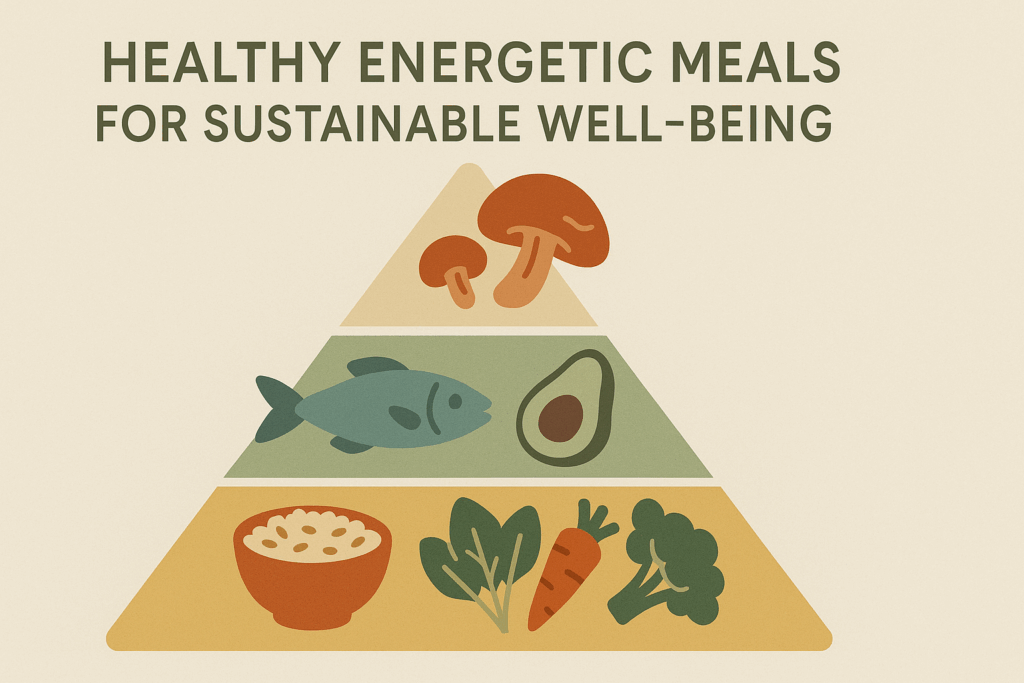In today’s fast-paced world, the demand for convenient yet nourishing foods has never been greater. Many individuals seek not just sustenance but meals that offer tangible benefits to their well-being. Energy meals have emerged as a critical part of this pursuit, especially for those dealing with chronic stress or anxiety. These meals, when thoughtfully crafted, can do more than fuel the body; they can also stabilize mood, enhance mental clarity, and support a resilient nervous system. Among the most compelling additions to this category are adaptogenic mushrooms, which offer a unique synergy of nutrition and stress support that aligns perfectly with the needs of a health-conscious, modern audience.
Adaptogenic mushrooms, revered in Eastern medicine for centuries, are increasingly backed by contemporary research for their ability to modulate the body’s stress response and promote homeostasis. These fungi, such as reishi, lion’s mane, cordyceps, and chaga, offer physiological resilience that complements the objectives of healthy meals for energy. When combined with balanced macronutrients and vibrant vegetables, these mushrooms contribute to energy meals that not only satisfy hunger but also actively reduce anxiety, fortify immunity, and enhance cognitive performance.
You may also like: Unlock Powerful Stress-Relief with Adaptogenic Mushrooms and Stamina Herbal Support

Understanding the Science Behind Energy Meals
Energy meals are more than calorie-dense foods; they are intentionally formulated to stabilize blood sugar, sustain energy release, and nourish the body at a cellular level. A well-constructed energy meal typically includes complex carbohydrates for steady glucose delivery, high-quality protein for tissue repair and neurotransmitter synthesis, and healthy fats to support hormonal balance. The inclusion of adaptogens like functional mushrooms adds a unique layer of support for the hypothalamic-pituitary-adrenal (HPA) axis, the body’s primary stress regulation system.
The science behind these meals lies in their ability to provide metabolic flexibility. Metabolic flexibility refers to the body’s capacity to efficiently switch between fuel sources—carbohydrates and fats—depending on activity level and nutritional availability. Meals that foster this adaptability tend to contain ingredients that support mitochondrial health, reduce oxidative stress, and enhance insulin sensitivity. These are critical aspects for anyone managing chronic fatigue or stress-related burnout, both of which are increasingly common in high-pressure academic and professional environments.
Adaptogenic mushrooms contribute bioactive compounds such as beta-glucans, hericenones, and triterpenes that have been shown to interact with neuroendocrine pathways. These interactions can buffer the physiological impacts of stress, regulate cortisol levels, and improve sleep quality. When integrated into energy meals, these fungi enhance the body’s ability to stay energized and mentally focused while minimizing the hormonal fluctuations that often lead to anxiety and exhaustion.

The Role of Adaptogenic Mushrooms in Stress-Relief Nutrition
The therapeutic potential of adaptogenic mushrooms is deeply intertwined with their unique phytochemical compositions. For example, reishi mushrooms (Ganoderma lucidum) contain triterpenes that exhibit anxiolytic and immune-modulating effects. Lion’s mane (Hericium erinaceus) is rich in compounds that stimulate the synthesis of Nerve Growth Factor (NGF), a protein essential for the maintenance and regeneration of neurons. Cordyceps enhances cellular energy production by increasing ATP (adenosine triphosphate), making it a powerhouse addition to meals designed for physical and cognitive vitality.
Chaga mushrooms (Inonotus obliquus), often regarded as an immune tonic, offer high antioxidant capacity that helps counteract the oxidative stress associated with chronic anxiety. This multifaceted support system is what makes adaptogens such an important part of energy-boosting meals. Unlike conventional stimulants that offer a temporary spike in energy followed by a crash, adaptogens work by enhancing the body’s resilience to stress over time, promoting long-lasting vitality and emotional equilibrium.
From a dietary integration standpoint, adaptogenic mushrooms are versatile and can be incorporated into a wide range of healthy meals that give you energy. Whether blended into smoothies, stirred into soups, or infused into grain bowls, these mushrooms pair well with other nutrient-dense ingredients. Their earthy flavors complement whole grains, legumes, leafy greens, and root vegetables—many of which are among the best vegetables for energy and mood regulation.

Building Blocks of Healthy Meals That Give You Energy
To design truly effective energy meals, it is essential to go beyond caloric value and consider nutrient density, bioavailability, and glycemic impact. Complex carbohydrates such as quinoa, farro, and sweet potatoes provide sustained energy without causing insulin spikes. These carbs work synergistically with adaptogens to create meals that energize while keeping blood sugar stable—a key factor in mood regulation and stress resilience.
Proteins play a critical role in neurotransmitter function. Foods like lentils, chickpeas, organic eggs, and wild-caught fish supply amino acids needed for the production of dopamine and serotonin, which directly influence mood and energy. Including adaptogenic mushrooms in protein-rich meals amplifies their benefits by supporting hormonal balance and neuroplasticity. For instance, a quinoa bowl topped with sautéed lion’s mane mushrooms, kale, and tahini dressing can serve as a complete, energizing, and anxiety-reducing meal.
Healthy fats such as avocados, flaxseeds, and olive oil contribute to the structural integrity of cell membranes and facilitate the absorption of fat-soluble vitamins. These fats also provide a sense of satiety and support cognitive performance, making them indispensable in energy meals. When paired with adaptogens, these meals support not only physical endurance but also mental clarity, a crucial benefit for those juggling multiple responsibilities in demanding environments.

Energy Meals and Mental Clarity: The Hidden Connection
One of the most underrated benefits of energy meals is their impact on cognitive performance. The brain requires a constant supply of glucose, fatty acids, and micronutrients to function optimally. Skipping meals or consuming processed foods can lead to brain fog, irritability, and decreased productivity. In contrast, meals rich in whole foods and adaptogens support synaptic plasticity, neurotransmitter balance, and neuroprotection.
Lion’s mane mushroom, in particular, has gained attention for its neuroregenerative properties. Studies have shown that its bioactive compounds can stimulate the growth of new neurons and enhance cognitive function in both animal and human models. This makes it an ideal addition to breakfast energy meals, which set the tone for the day. A smoothie made with banana, almond butter, spinach, and lion’s mane extract can provide sustained energy and mental clarity without the jitteriness associated with caffeine.
Moreover, meals that include magnesium-rich ingredients such as leafy greens and seeds can further improve mental function by regulating stress hormones and enhancing sleep quality. These meals often qualify as some of the best energy meals because they address the root causes of fatigue rather than merely masking symptoms. By supporting the brain and adrenal glands, these meals create a foundation for both short-term performance and long-term well-being.

Culinary Creativity: Crafting Energy Boosting Meals with Adaptogens
Creating delicious and functional energy boosting meals with adaptogens doesn’t require a culinary degree, but it does benefit from a basic understanding of flavor profiles and nutrient pairings. Adaptogenic mushrooms often have earthy, umami-rich flavors that can enhance savory dishes. For instance, reishi pairs beautifully with broth-based soups, while cordyceps can be blended into energy balls or protein shakes without overpowering other ingredients.
One particularly popular preparation is a hearty grain bowl featuring brown rice, sautéed spinach, roasted sweet potatoes, and a miso-reishi dressing. This dish not only satisfies the palate but also provides a balanced mix of macronutrients and adaptogenic support. For a more portable option, consider mushroom-powered energy bites made with oats, dates, almond butter, and powdered chaga. These snacks offer a quick energy boost while also delivering stress-relieving compounds in a convenient format.
Incorporating adaptogens into breakfast, lunch, and dinner routines ensures consistent support throughout the day. For breakfast, oatmeal with chia seeds, blueberries, and lion’s mane powder sets a positive tone. For lunch, a lentil stew with reishi and kale offers sustained energy, while a dinner of grilled salmon, steamed broccoli, and quinoa with cordyceps supports recovery and relaxation. These meals are not only nutritious but also align with the principles of healthy meals for energy and stress support.
Energy Meals for High-Stress Lifestyles
Busy professionals, students, and caregivers often struggle with maintaining balanced nutrition due to time constraints. However, this is precisely the demographic that stands to benefit most from consistent energy meals. The incorporation of adaptogenic mushrooms into meal prep routines can offer a convenient and impactful solution. By preparing versatile components such as cooked grains, roasted vegetables, and adaptogen-infused sauces ahead of time, individuals can assemble nourishing meals in minutes.
Stress often leads to poor food choices, perpetuating a cycle of low energy, irritability, and compromised immune function. Energy meals that are easy to prepare and mentally satisfying can break this cycle by offering both convenience and therapeutic value. A simple stir-fry of broccoli, carrots, tempeh, and cordyceps powder served over brown rice can provide a wholesome alternative to takeout, offering both energy and stress relief in one bowl.
For those constantly on the move, portable options like mason jar salads with adaptogenic dressings or pre-blended smoothies with mushroom powders can provide essential nutrients without sacrificing time. These options meet the criteria for healthy energetic meals that are accessible, effective, and enjoyable. Planning ahead and choosing ingredients strategically can transform everyday meals into tools for resilience and vitality.

Why the Best Energy Meals Include the Best Veggies for Energy
Vegetables are foundational to any healthy diet, but when it comes to energy meals, certain vegetables rise above the rest. The best vegetables for energy include leafy greens like kale and spinach, which are high in magnesium and folate, as well as root vegetables like sweet potatoes and beets, which offer complex carbohydrates and antioxidants. These ingredients not only fuel the body but also contribute to mood regulation and stress tolerance.
Cruciferous vegetables like broccoli and Brussels sprouts support liver detoxification, which is essential for hormonal balance and energy metabolism. When combined with adaptogenic mushrooms, these vegetables create meals that support detox pathways while also reinforcing adrenal function. For example, a roasted vegetable medley with Brussels sprouts, red onions, and chaga-glazed carrots can be both energizing and therapeutic.
Color diversity in vegetables also signifies a range of phytonutrients that offer protective benefits against inflammation and oxidative stress. Including a rainbow of vegetables in energy meals ensures a broad spectrum of vitamins and minerals, which are crucial for enzymatic functions and mitochondrial health. This comprehensive nutritional support is what differentiates the best energy meals from ordinary, calorie-dense options.

Healthy Energetic Meals for Sustainable Well-Being
Long-term health and energy depend on consistency, variety, and nutrient synergy. Healthy energetic meals that include a range of macronutrients, micronutrients, and adaptogenic compounds offer a holistic approach to wellness. These meals do more than energize; they support endocrine balance, cognitive function, immune resilience, and emotional stability.
Incorporating a wide array of whole foods, from quinoa and lentils to salmon and spinach, provides the raw materials the body needs to thrive. Adding adaptogenic mushrooms introduces an element of preventive care, helping the body adapt to daily stressors and reduce the risk of chronic disease. Unlike fad diets or short-term cleanses, these meals offer sustainable nourishment that supports both immediate performance and long-term health.
Practical tips for maintaining a routine of healthy meals that give you energy include meal planning, batch cooking, and diversifying ingredients weekly to avoid monotony. Seasonal eating also enhances nutritional density and environmental sustainability. A rotating menu of meals featuring local produce and functional fungi not only keeps meals interesting but also supports ecological and personal resilience.
Frequently Asked Questions (FAQ) on Energy Meals and Adaptogenic Mushrooms
How can energy meals help regulate mood throughout the day?
Energy meals support mood stability by maintaining consistent blood sugar levels, which are closely linked to emotional balance. When glucose levels fluctuate dramatically due to processed or sugary foods, it can trigger irritability, anxiety, or fatigue. Conversely, meals designed to release energy steadily—with complex carbohydrates, fiber-rich vegetables, and healthy fats—foster a more even emotional state. Adaptogenic mushrooms in these meals further enhance emotional resilience by modulating the body’s response to stress. This combination helps prevent mood swings and supports a calmer, more focused mindset.
What are the long-term benefits of regularly consuming healthy energetic meals?
Regular consumption of healthy energetic meals contributes to improved metabolic health, enhanced cognitive function, and long-term hormonal balance. Over time, these meals help optimize mitochondrial efficiency, reducing the risk of energy slumps and chronic fatigue. They also support neuroplasticity, improving brain adaptability and memory. Integrating adaptogenic mushrooms into your diet can reinforce the immune system and reduce inflammation, which are key to preventing chronic stress-related conditions. As a lifestyle choice, these meals form the foundation of sustained physical and emotional well-being.
What are the best vegetables for energy that also support adaptogen absorption?
The best vegetables for energy that complement adaptogen bioavailability include spinach, kale, and broccoli. These leafy greens are high in magnesium and vitamin C, both of which enhance the absorption and efficacy of adaptogenic compounds like those found in reishi or lion’s mane. Beets and carrots, rich in antioxidants and nitrates, also support oxygen circulation and stamina. Additionally, cruciferous vegetables such as Brussels sprouts assist liver detoxification, helping the body process and benefit more effectively from adaptogens. When included in energy meals, these vegetables amplify both nutritional value and therapeutic potential.
How can I personalize energy boosting meals for different times of day?
Personalizing energy boosting meals based on your daily rhythm can enhance productivity and recovery. For morning meals, focus on easily digestible options like smoothies with adaptogenic powders and fresh fruits to energize without taxing digestion. Midday meals should emphasize complex carbs and lean proteins for sustained energy, such as a quinoa bowl with roasted vegetables and cordyceps. Evening meals should lean toward calming adaptogens like reishi, paired with light proteins and steamed vegetables to promote restful sleep. This tailored approach ensures that your meals support your natural energy cycles without overstimulation.
Can energy meals support high-performance goals such as athletic training?
Yes, energy meals are especially beneficial for athletes and active individuals due to their emphasis on nutrient density and physiological resilience. Including healthy meals for energy that are rich in antioxidants, electrolytes, and amino acids can improve endurance and recovery times. Cordyceps mushrooms, in particular, enhance ATP production and oxygen utilization, supporting high-intensity performance. Meanwhile, the inclusion of complex carbohydrates and plant-based proteins ensures sustained energy release during prolonged activities. For those with demanding fitness goals, these meals can be a natural alternative to synthetic supplements.
Why are the best energy meals ideal for managing adrenal fatigue?
The best energy meals provide essential nutrients that help regulate cortisol production and replenish depleted adrenal reserves. Whole grains like millet and oats, combined with omega-3-rich fats and adaptogenic mushrooms, nourish the endocrine system and reduce the physiological burden of chronic stress. These meals also contain B vitamins and trace minerals that are often deficient in individuals with adrenal fatigue. Importantly, they avoid ingredients that overstimulate, such as caffeine or added sugars, which can exacerbate hormonal imbalances. By supporting both nourishment and stress recovery, they offer a comprehensive solution for adrenal support.
What role do healthy meals that give you energy play in mental resilience?
Healthy meals that give you energy lay the groundwork for mental resilience by stabilizing neurotransmitter production and buffering oxidative stress. Foods rich in tyrosine, tryptophan, and choline support the synthesis of dopamine, serotonin, and acetylcholine, which are essential for mood, focus, and memory. Adaptogens like lion’s mane further strengthen neural pathways, enhancing long-term brain health. Paired with nutrient-rich vegetables and healthy fats, these meals protect against the cognitive decline often associated with prolonged stress. A consistent dietary pattern that supports brain function also empowers individuals to remain emotionally adaptable in challenging situations.
Are there seasonal variations in the best veggies for energy?
Absolutely. Seasonal variations in the best veggies for energy not only ensure freshness and higher nutrient density but also align with the body’s changing needs throughout the year. In the summer, hydrating vegetables like cucumbers, bell peppers, and zucchini support cooling and electrolyte balance. Autumn and winter favor root vegetables like sweet potatoes and turnips, which offer grounding energy and higher carbohydrate content to sustain warmth. Spring brings bitter greens like dandelion and arugula, which assist detoxification and rejuvenation. Rotating vegetables with the seasons keeps meals interesting and nutritionally adaptive, supporting the natural rhythm of energy regulation.
How do energy meals influence gut-brain communication?
Energy meals positively influence the gut-brain axis by providing prebiotics, polyphenols, and adaptogens that nurture the microbiome and reduce systemic inflammation. The inclusion of fermented foods like kimchi or miso in these meals can promote the growth of beneficial bacteria, enhancing mood-regulating neurotransmitter production. Adaptogenic mushrooms such as chaga and reishi also contain immunomodulatory compounds that interact with gut-associated lymphoid tissue (GALT). This interaction helps regulate immune responses and promotes a more balanced stress reaction. A healthy gut ecosystem translates into improved emotional regulation, better digestion, and more sustained energy levels.
What are emerging innovations in preparing healthy energetic meals at home?
Emerging innovations in preparing healthy energetic meals at home include the use of precision nutrition apps, mushroom-infused cooking oils, and pre-portioned adaptogen meal kits. Smart kitchen technology now allows for personalized nutrient tracking based on biometric feedback, enabling tailored energy-boosting meals. Mushroom oils derived from lion’s mane or cordyceps are becoming popular for their subtle flavor and therapeutic benefits when used in sautéing or dressings. Meal kits infused with freeze-dried adaptogens are also making it easier for busy individuals to incorporate medicinal mushrooms into their diets. These tools streamline the process of creating meals that are both functional and flavorful.
Discovering the Role of Energy Meals in Cognitive Longevity
Energy meals are increasingly being studied for their impact on cognitive longevity. The nutrient synergy in these meals helps mitigate oxidative stress, reduce neuroinflammation, and support neural regeneration. Ingredients like turmeric, walnuts, and lion’s mane mushrooms, when combined, can enhance memory retention and processing speed over time. As people live longer and seek to preserve mental sharpness, these meals serve as a preventative tool against cognitive decline. Making energy meals a consistent part of one’s diet supports not just current vitality but also future brain health.
Optimizing Your Lifestyle with Healthy Meals for Energy and Mental Clarity
Lifestyle optimization starts with the consistency of what we eat, and healthy meals for energy are foundational to achieving both mental clarity and emotional resilience. When paired with mindfulness practices, adequate hydration, and movement, these meals become part of a broader wellness strategy. Ingredients like flaxseeds, quinoa, and adaptogenic powders contribute to balanced neurotransmitter activity and hormone production. They also reduce reliance on caffeine or sugar-based quick fixes that lead to energy crashes. Ultimately, integrating these meals into your routine can reshape not only your physical health but your overall sense of clarity and presence throughout the day.
Conclusion: Energize Your Life with the Healing Power of Food
The pursuit of effortless energy and emotional balance does not require extreme interventions or complex protocols. It begins with the simple, daily practice of choosing meals that nourish both body and mind. Energy meals infused with adaptogenic mushrooms offer a scientifically grounded, nutritionally complete solution for those seeking to enhance vitality and manage stress naturally.
By focusing on whole foods, adaptogenic support, and nutrient synergy, individuals can craft meals that elevate energy, improve focus, and fortify mental health. These meals, which include the best veggies for energy and functional ingredients like reishi and lion’s mane, are not only delicious but deeply therapeutic. They exemplify the union of ancient wisdom and modern nutritional science, offering a path to sustainable well-being that is both practical and profound.
In a world where stress is inevitable and demands are high, energy meals provide a daily opportunity to reclaim agency over one’s health. They are more than food; they are a lifestyle choice that aligns with the principles of resilience, balance, and vitality. Embracing these meals is not merely a dietary shift but a commitment to living with greater energy, clarity, and peace.
Further Reading:
Natural Energy Boosters: Foods That Give You Energy
Energy-boosting dinner recipes
Get More Energy: 40 Recipes That’ll Give You the Boost You Need
